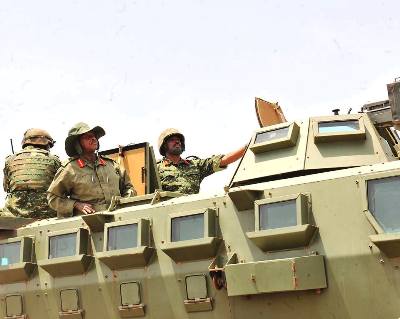Concession to rebels not sign of weakness: Salva Kiir
October 29, 2014 (JUBA) – South Sudan’s president, Salva Kiir, says his government heeded to demands from rebels led by his former deputy, Riek Machar for the sake of peace, but not due weaknesses.

“Our people are tired of war and I have always said that I will not be the first to take them and the country to war,” Kiir said on Wednesday.
The current was allegedly created by people who were impatience to wait for democratic processes, which they claim to advocate for.
“It was a predetermined and imposed war,” the president said.
“Our people know this and this is why we have been saying that the position of the government, which I repeated in the recent meeting with the president of Kenya and the prime ministers of Ethiopia and Uganda, is peace. But this doesn’t mean we are weak,” he added.
The president’s remarks came as he officially opened this year’s governor’s forum held in the capital, Juba. Several officials, donors, legislators and civil society members are attending the annual event.
Members of the country’s ruling party (SPLM) reportedly encouraged the president to turn moments of challenges into real opportunity.
UGANDAN TROOPS TO REMAIN
The president said his government would not accept the withdrawal of Ugandan troops from the country, arguing that their presence was based on an agreement the two nations signed.
South Sudan and Uganda recently signed a cooperation agreement, permitting the latter to purchase weapons on behalf of the former incase an arms embargo is imposed on to the country.
The presidential spokesperson, Ateny Wek Ateny, also confirmed the South Sudanese leader’s statement, stressing that desires for peace necessitated all these concessions, but not indications of weakness.
“The concessions are not due to any weakness on the part of the president. It is purely an indication of serious commitment and desire to bring peace to this country through peaceful dialogue,” he said.
NO BREAKTHROUGH
The SPLM-in-opposition say they do not see any breakthrough on power-sharing as alleged by government, saying Kiir still interpreted a power-sharing as an arrangement that should deny executive powers for the position of prime minister for the rebels.
“We want the executive powers so that we ensure full implementation of the would-be peace agreement. We also don’t want to give Salva Kiir another chance to abuse powers and use them again to reignite another crisis,” Machar’s spokesperson James Gatdet Dak told Sudan Tribune.
The Juba government, he added, had not yet come out clearly that the federalism system and accompanying reforms to be implemented during the transitional period.
Observers and analysts contend that South Sudanese army (SPLA) forces would not have maintained control of Juba had it not been for the presence of Ugandan troops fighting in support of president Kiir.
“There was a risk that South Sudan security force will deteriorate. Units run out of fuel. Tanks were not properly positioned and there were no people to run them. Pay systems has always been an issue. There was a conspicuous reduction in the overall readiness of the police and army,” an observer noted.
“The rebels are in survival mode in the country with the believe that they can overran the government of Salva Kiir should the Ugandan troops pull out as of today, which may have some truth given the way things happened in our watch last year,” he added.
Kiir’s leadership, analysts argue, could face significant challenges if foreign forces left the country or refrained from backing armed forces loyal to the Juba establishment.
(ST)
